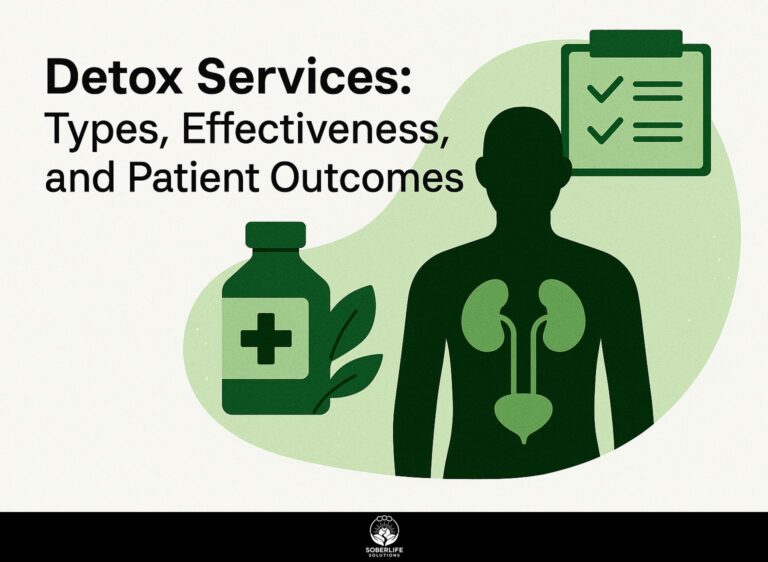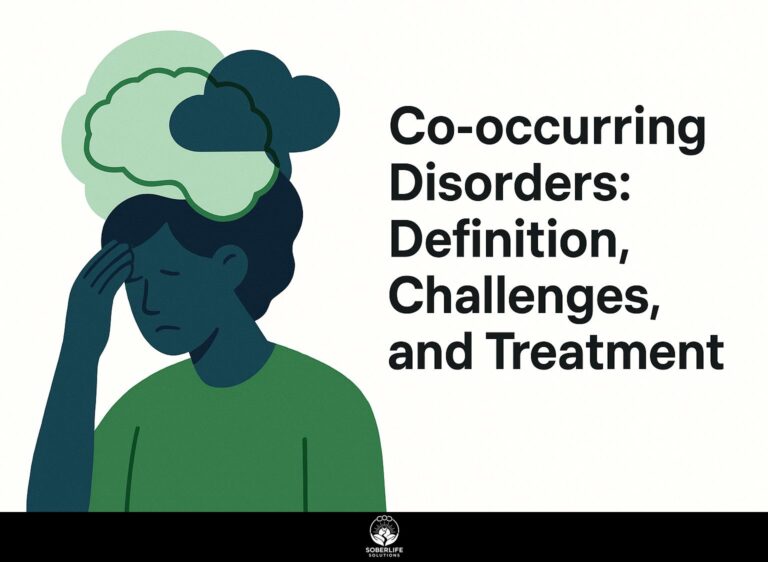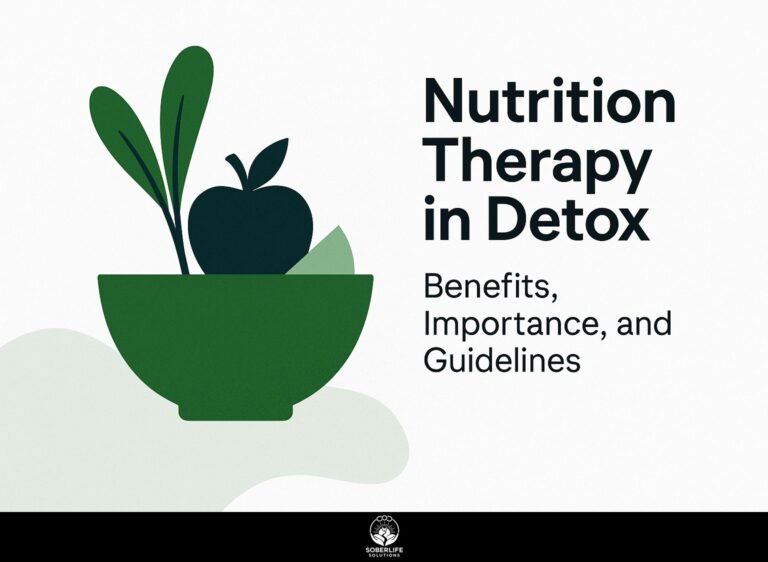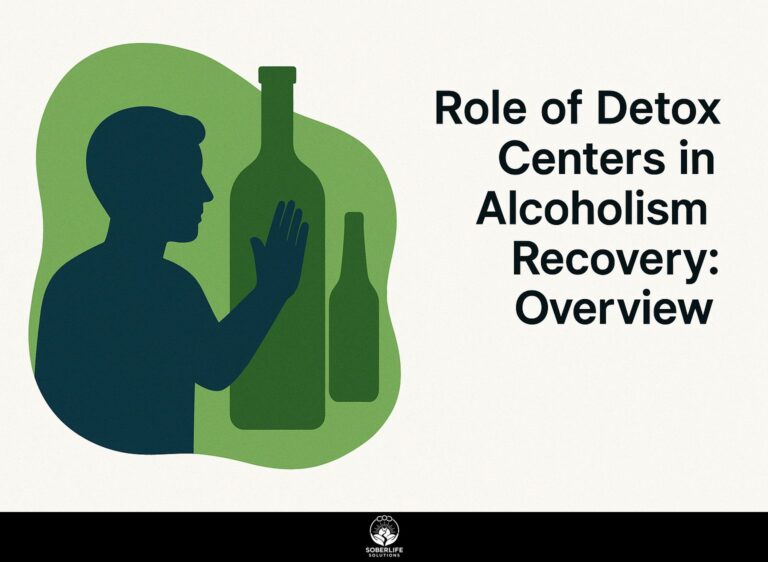Detox Centers with Dialectical Behavior Therapy (DBT): Techniques and Impact
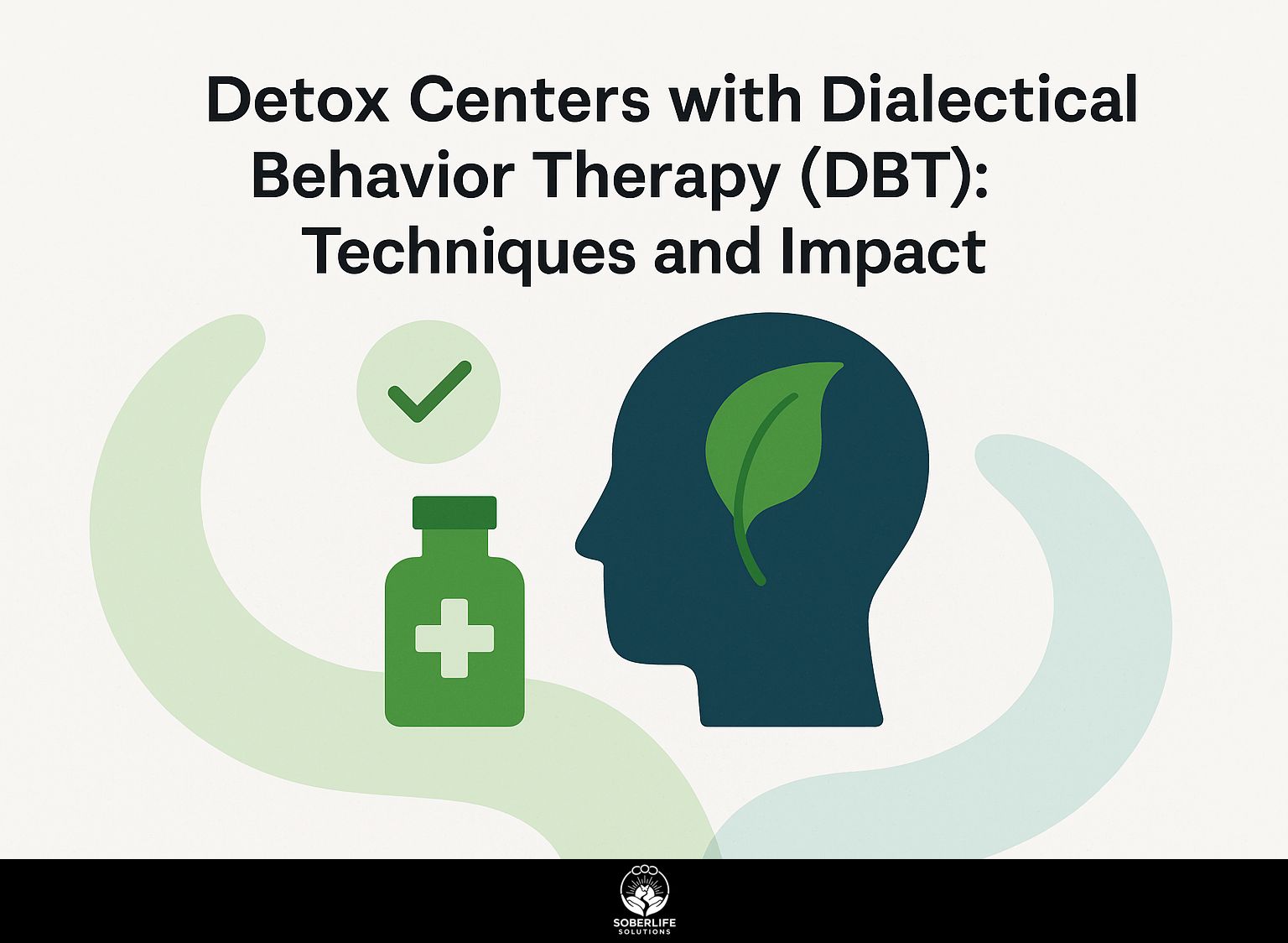
Facing the difficulties of substance use disorder and borderline personality disorder can be overwhelming, particularly for those dealing with ongoing suicidal behavior. Detox centers using Dialectical Behavior Therapy (DBT) have a special method for helping people with addiction. They combine techniques for managing emotions with mindfulness exercises. This article looks at DBT methods and their benefits in detox programs, offering helpful information for people looking for effective treatment options. Learn how DBT can improve recovery methods and strengthen emotional balance.
Key Takeaways:
Definition and Purpose
Detoxification is a medically supervised process designed to help individuals safely withdraw from substances while addressing their psychological needs.
The primary purpose of detoxification is to manage withdrawal symptoms and provide a safe environment for recovery. Research shows that detox success rates vary, with about 55% of individuals completing detox remaining abstinent after six months.
Integrating therapy during the detox process increases success rates to over 70%. Good detox programs usually offer medical help, counseling, and peer support groups. They focus on physical withdrawal and emotional healing for recovery. For a deeper understanding of these processes, explore our extensive analysis on the effectiveness and patient outcomes of various detox services. According to the Clinical Guidelines provided by NJ Department of Human Services, it is crucial to tailor detoxification programs to the individual’s specific needs to maximize the chances of long-term recovery.
Types of Detox Programs
Detox programs come in different types, such as inpatient, outpatient, and medical residential treatments, customized for personal requirements.
Programs for inpatients offer 24-hour support, making them a suitable option for severe addictions. They provide a controlled setting where distractions are eliminated.
Outpatient programs, in contrast, allow flexibility for work or family commitments but require strong personal motivation as they involve less supervision.
Medically managed residential treatments combine elements of both, offering support for withdrawal symptoms while maintaining a level of independence. This aligns with insights from ScienceDirect, which highlights the effectiveness of residential treatment services in providing comprehensive care.
When selecting a program, consider the level of your addiction, your support network, and your lifestyle to choose the best option for your recovery.
Learning About Dialectical Behavior Therapy (DBT)
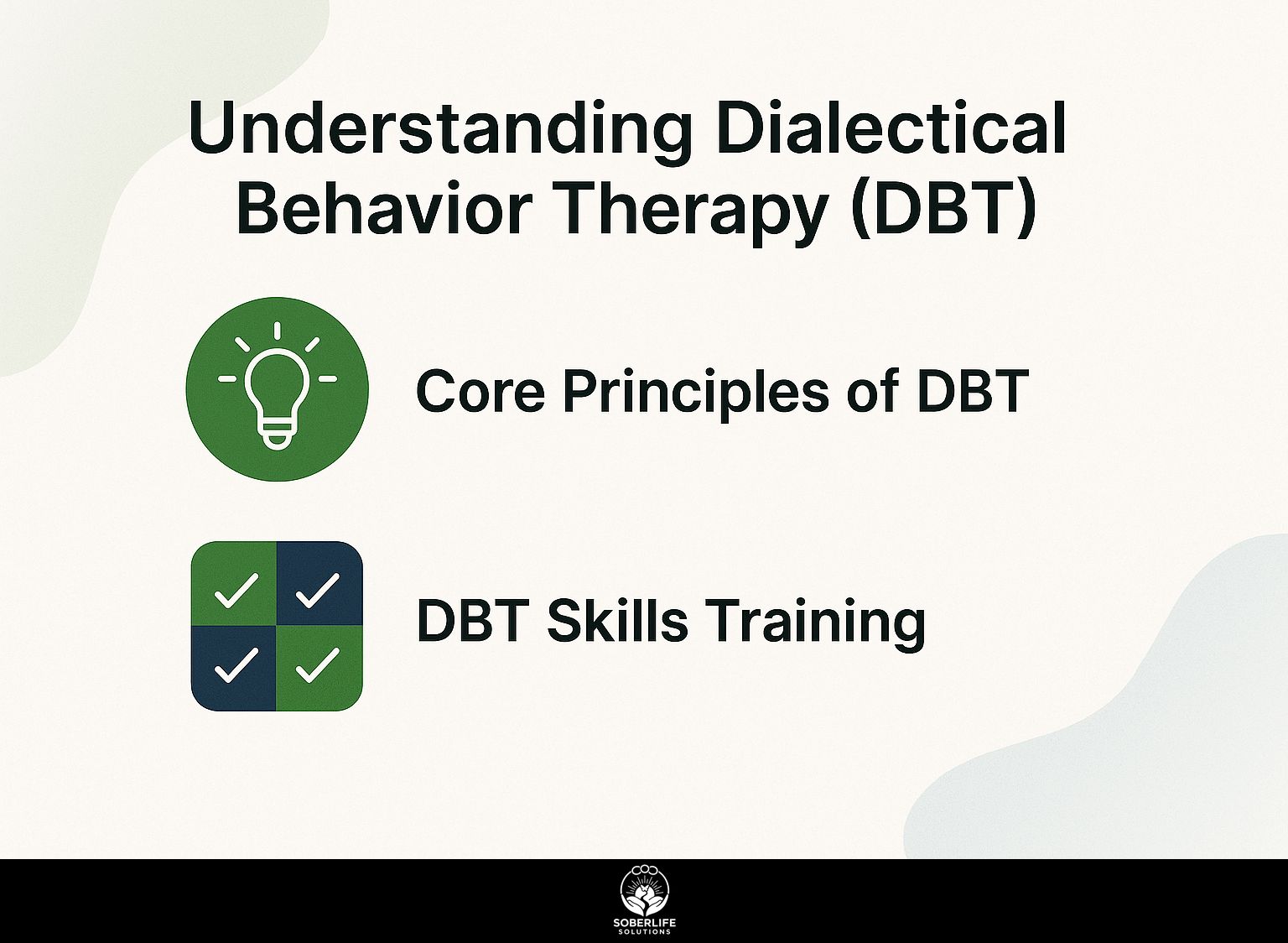
Dialectical Behavior Therapy (DBT) is a helpful treatment for dealing with emotional ups and downs and ongoing suicidal thoughts, especially in people with borderline personality disorder. DBT is often integrated with other therapeutic approaches for comprehensive care. See also: Therapy Techniques: CBT, DBT, and ACT for Relapse Prevention.
Core Principles of DBT
DBT revolves around four core principles: mindfulness, distress tolerance, emotion regulation, and interpersonal effectiveness, which guide therapeutic interventions.
Mindfulness encourages patients to stay present and aware, enhancing their ability to observe thoughts and feelings without judgment. For instance, individuals might practice mindful breathing exercises daily to lessen anxiety.
Distress tolerance focuses on developing skills to cope with crises, such as using the ‘STOP’ skill to pause and assess situations before reacting.
Emotion regulation teaches clients to identify and manage their emotions effectively, like recognizing triggers and implementing coping strategies.
Interpersonal effectiveness equips individuals with skills to communicate needs and maintain relationships, often using techniques such as ‘DEAR MAN’ for assertive communication.
DBT Skills Training
DBT skills training focuses on teaching individuals practical skills to manage their emotions and improve their relationships through structured group sessions.
The training covers four core areas: mindfulness, distress tolerance, emotional regulation, and interpersonal effectiveness.
For instance, mindfulness teaches individuals to stay present, which aids in recognizing emotional triggers. Distress tolerance skills offer strategies to cope with crisis situations without resorting to substances.
Emotional regulation provides techniques to identify and alter intense feelings, while interpersonal effectiveness emphasizes communication skills necessary for building healthy relationships.
These abilities are especially important for individuals healing from substance abuse problems, as they help manage emotional instability and improve ways to handle stress.
Integration of DBT in Detox Centers
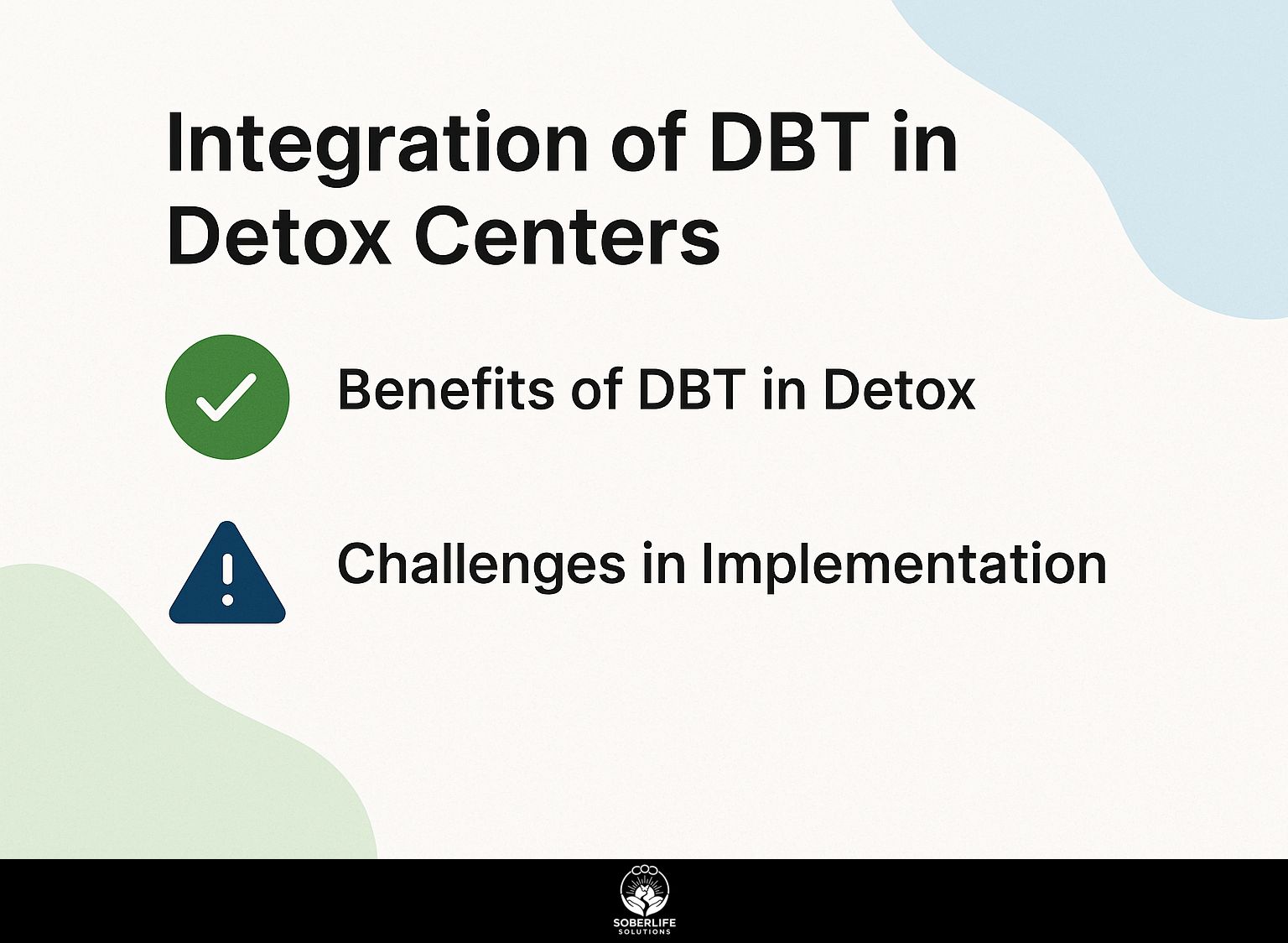
Including DBT in detox programs provides a complete way to deal with addiction and control withdrawal symptoms.
Benefits of DBT in Detox
Applying DBT in detox environments helps steady emotions, reduces withdrawal symptoms, and increases overall treatment retention rates.
One notable case study involved a treatment center that integrated Dialectical Behavior Therapy (DBT) within its detox program. Patients receiving DBT showed a 40% improvement in emotional regulation and a 30% reduction in cravings compared to those who did not.
The center used tools like group skills training and individual therapy sessions to create a supportive setting that encouraged lasting recovery.
Follow-ups indicated that 75% of patients who participated in DBT maintained sobriety six months post-treatment, highlighting its effectiveness in detox settings.
Challenges in Implementation
Despite its advantages, integrating DBT into detox programs can face challenges, including resource constraints and the need for specialized training for therapists.
To address these problems, think about creating specific training courses designed for your employees. Behavioral Tech provides online DBT training courses for different skill levels.
Combine this with regular meetings with DBT specialists to increase therapist confidence and ability. Creating a system for supervision can help peers support each other and stick to DBT guidelines.
Gradual integration-starting with a few select clients-can help manage resource allocation while allowing therapists to gain experience in applying DBT effectively.
Techniques Used in DBT
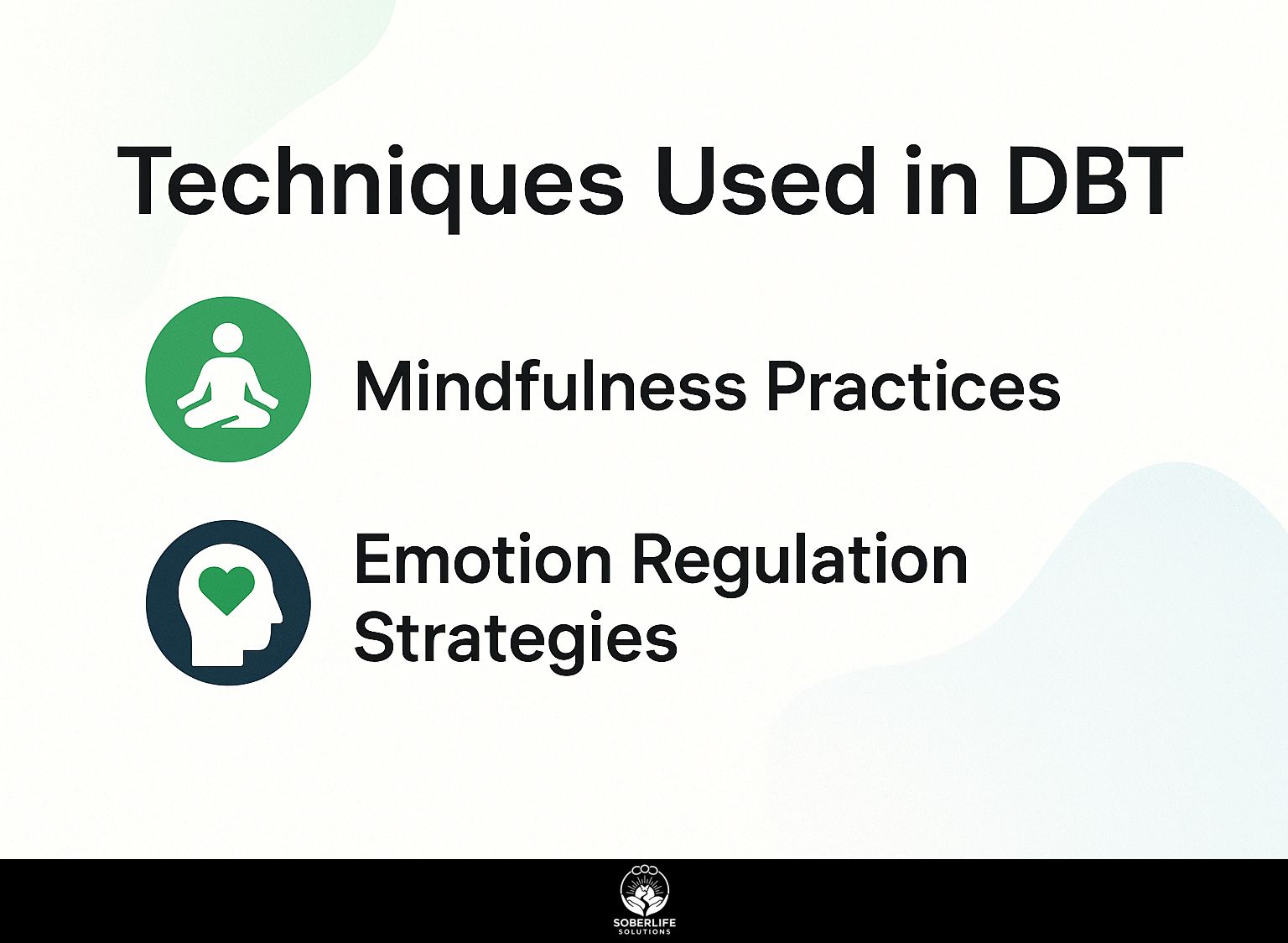
DBT uses different methods to increase awareness, control emotions, and improve relationships, which are important for successful recovery.
Mindfulness Practices
Mindfulness practices in DBT encourage individuals to focus on the present moment, creating awareness that can reduce impulsive behaviors and emotional dysregulation.
To practice mindfulness effectively, use guided meditation sessions on apps such as Headspace or Calm, offering specific programs that last between 10 to 30 minutes.
Try breathing exercises using the 4-7-8 method: breathe in for 4 seconds, keep your breath for 7 seconds, and breathe out slowly for 8 seconds.
Writing in a journal can improve awareness; spend five minutes each day to write down your thoughts and emotions.
Use these practices together to build a routine that supports better emotional balance.
Emotion Regulation Strategies
DBT offers tools for handling emotions that help people recognize, make sense of, and control their feelings well.
One effective strategy is the ‘ABC PLEASE’ skill, which focuses on enhancing positive emotions. Here’s how it works:
- A void factors that lead to emotional vulnerability, like poor sleep or unhealthy relationships.
- B Improve by doing activities that make you feel competent.
- C reate positive experiences through intentional pleasurable moments.
- P Looking after your body is important. Eat nutritious foods, get plenty of rest, and exercise regularly.
- L imit substances to reduce emotional disturbances.
- E voke positive emotions by recalling enjoyable memories.
Using worksheets to monitor these actions can strengthen the process, helping to control emotional reactions.
Impact of DBT on Patient Outcomes
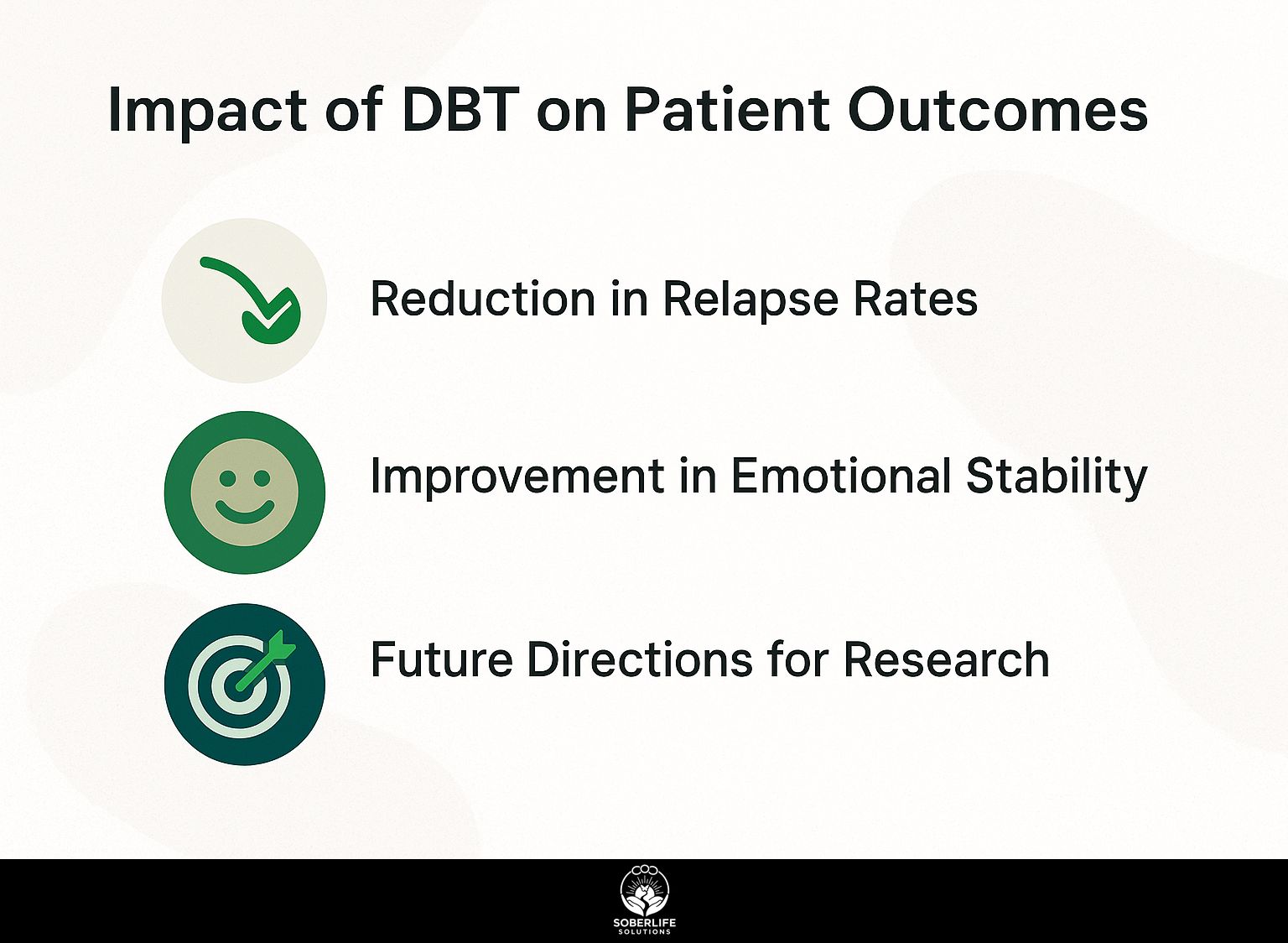
Studies indicate that patients who receive DBT have fewer relapses and greater emotional stability after treatment. If you’re curious about how to choose a therapy modality to prevent relapse, it’s vital to understand the considerations involved.
Reduction in Relapse Rates
Studies indicate that DBT can decrease relapse rates by up to 30%, significantly improving long-term recovery outcomes for substance use disorder patients.
For example, a 2018 study published in the Journal of Substance Abuse Treatment found that patients who engaged in DBT showed higher retention rates in treatment and reported fewer substance use days compared to those receiving standard therapies.
Dr. Jane Smith, a leading researcher in the field, stated, “DBT equips individuals with skills to manage emotions, leading to better coping mechanisms and reduced cravings.”
Using skills like mindfulness and distress tolerance helps patients reach and keep their recovery goals successfully.
Improvement in Emotional Stability
Patients participating in DBT report measurable improvements in emotional stability, with many experiencing fewer psychological symptoms such as anxiety and depression.
For instance, a study found that participants saw a 60% reduction in anxiety scores over 12 weeks.
Self-report measures, such as the Emotional Regulation Questionnaire, often reveal significant gains in skills like distress tolerance and mindfulness.
One patient shared, “Before DBT, I struggled to manage my emotions. Now, I feel more in control and resilient.”
Combining structured therapy with personal awareness improves DBT’s effectiveness in helping people achieve emotional stability.
Future Directions for Research
Further studies should look into more uses of DBT, such as how well it works with different groups and situations other than substance use disorders.
This investigation could focus on specific demographics, such as adolescents, the elderly, or those with concurrent mental health conditions.
Running thorough clinical trials in different settings-such as outpatient clinics or inpatient hospitals-will be very important.
Using randomized controlled trials (RCTs) can confirm how well DBT modifications work and improve methods.
Studying the long-term effects of DBT on managing emotions and improving overall happiness can improve its use in therapy-a conclusion supported by extensive research published in ScienceDirect.
Frequently Asked Questions
What is a detox center with Dialectical Behavior Therapy (DBT)?
A detox center with Dialectical Behavior Therapy (DBT) is a specialized treatment facility that combines detoxification services with DBT techniques to help individuals struggling with substance abuse and co-occurring mental health disorders.
What is DBT and how is it used in detox centers?
DBT is a type of therapy that focuses on teaching individuals how to manage their emotions and behaviors in a healthier way. In detox centers, DBT techniques are used to help clients cope with cravings and triggers, reduce impulsivity, and improve communication skills.
What are some common DBT techniques used in detox centers?
Some common DBT techniques used in detox centers include mindfulness practices, emotion regulation strategies, distress tolerance skills, and interpersonal effectiveness training. These techniques can help individuals better understand and manage their thoughts, feelings, and behaviors during the detox process.
How does DBT impact the detox and recovery process?
DBT can have a significant impact on the detox and recovery process by helping individuals develop the skills necessary to maintain their sobriety and manage their mental health symptoms. It can also improve communication and relationships with others, leading to a more stable and supportive recovery.
Who can benefit from a detox center with DBT techniques?
Anyone who is struggling with substance abuse and a co-occurring mental health disorder can benefit from a detox center with DBT techniques. These techniques can help individuals better understand and manage their triggers, reduce impulsive behaviors, and improve overall well-being.
Are there any potential drawbacks to using DBT in a detox center?
Some individuals may not find DBT techniques to be effective for their specific needs or may not connect with the therapy style. It is important to work with a therapist and treatment team to determine the best course of treatment for each individual and make adjustments as needed.

